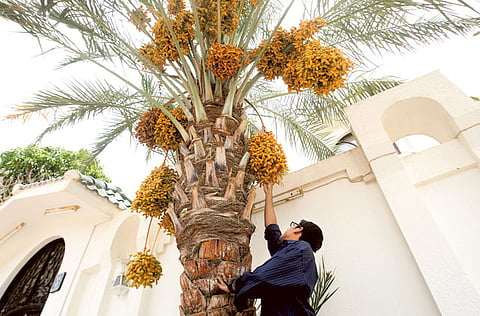Fresh Abu Dhabi dates to return to market following last year’s success
Abu Dhabi Farmers’ Services Centre hopes to produce more than 50 tonnes of fresh dates

Abu Dhabi: Having tasted tremendous success in its very first year of marketing fresh dates last year, domestic and foreign markets are likely to get more from Abu Dhabi farms this year.
The Abu Dhabi Farmers’ Services Centre (ADFSC), an Abu Dhabi Government organisation, for the first time marketed 50 tonnes of fresh dates last year and it expects more produce this harvest season, which has already begun, a senior official told Gulf News.
“The centre and farmers are excited about the demand for fresh dates from domestic and international markets. We will have more fresh dates this year, so we are exploring more foreign markets as well,” Ray Moule, Technical Services Director at ADFSC, said.
Although there are 40 million date palm trees in Abu Dhabi emirate most of them are on public land, mainly on roadsides and under the scope of the municipalities, he said. The centre is working with about 200 farms that have 3.5 million date palms, which supplied 50 tonnes of dates last year.
“Fresh dates constitute a small portion only …maybe about ten per cent of total dates produced in the emirate,” Moule said.
Fresh dates without any preservatives have a shelf life of three to four days. The centre is marketing them under the brand name ‘Local Harvest’. However, the dried fruit has a shelf life of about one year.
However, not all types of dates can be sold fresh because of a high content of an organic chemical ‘tannin’ that reportedly causes them to have a bitter taste.
But a few varieties such as khalas, birhi and neghal have a low tannin content. These varieties are sold fresh, Moule said.
The centre does not deal with dried dates, which constitute the major market share. A semi-government company, Al Foah, markets these.
There are four stages of date ripening — khalal (still green), bessar (bright yellow or red colour), rotab (turning brown) and tamar (fully ripe and dried).
The dates harvested in their second and third stages are the ones sold as fresh dates, the official said.
Rotabs, being almost brown in colour, are the most popular among the UAE population. At the bessar stage also, they are fit for consumption but since they are bright yellow or red in colour, people are not aware they are edible. People think that only brown dates can be eaten, Moule said.
“Fresh dates [not brown in colour] displayed at a shop are still a new concept here,” he said.
Bessar dates are used for export as they will be ripe by the time they reach the destination.
The centre expects more demand for fresh dates during Ramadan.
“Many people like to end the fast with fresh dates; that was the tradition here in the past,” he said.
With the Liwa Date Festival set to begin next month, the sale of fresh dates is just the start of the harvest season that runs until October and highlights the importance of dates to the economic and cultural fabric of the UAE. The festival will display all varieties of dates in the region.
The Abu Dhabi Food Control Authority estimated that in 2011 the total value of date exports from the UAE was Dh112.6 million. This high volume of exports is testament to the high quality of dates produced in the UAE.



